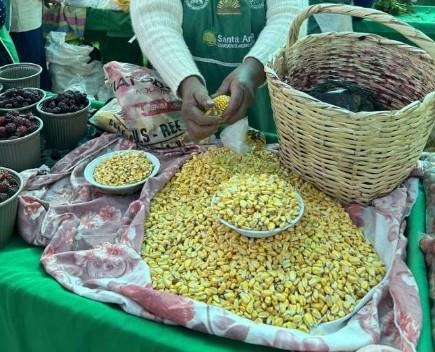"There's no doubt we can produce enough food for the world's population—humanity is strategic enough to achieve that. The question is whether—because of war and conflict and corruption and destabilization—we do," said World Food Program leader David Beasley in an interview with Time magazine earlier this year.

Maize for sale at Cotacachi's agroecological market in Ecuador
Indeed, projections show that we are not on track to achieve Sustainable Development Goal 2 of Zero Hunger by 2030. As climate and security crises continue to destabilize our food sources, researchers are taking a critical look not just at how we produce food—but at the entire systems behind our food supplies. In this case, the systems behind the seeds that produce our food crops.
"Whilst adapting crops to climate change and conserving their variation is essential for food security, these measures are meaningless if farmers do not have access to the seeds," says crop scientist and food system expert Ola Westengen. Westengen leads the team of researchers from the Norwegian University of Life Sciences (NMBU) who recently reviewed the state of seed systems for small-holder farmers in low/middle income countries.
Their findings are now published in the Proceedings of the National Academy of Sciences.
What are seed systems?
Seed systems are the provision, management and distribution of seeds. They cover the entire seed chain, from the conservation of their diversity and variety development, to their production and distribution, and the rules that govern these activities. In short, they are the structures that make seeds available to farmers so that crops can be sown, harvested and end up on our plates.
While a well-functioning seed system will ensure seed security for all farmers, the researchers say that, in practice, it is rarely the case that seed systems function as well as they might. Seed systems can be disrupted by conflict and disasters, as well as by problems stemming from social inequality, lack of coordination or inappropriate policies.
What does this study tell us that we don't already know?
"There are recent innovations and investments by governments and donors to improve farmers' access to diverse crop varieties and quality seeds," explains Teshome Hunduma, a seed governance researcher and co-author of the study. "For example, there are now more flexible policies and regulations that encourage diversity in the seed systems used by farmers, rather than pushing farmers to switch to commercial seed systems that focus on less diverse commodity crops—which is the norm."
Commodity crops are those grown in large volume and high intensity for the purpose of sale, as opposed to those grown by small-holder farmers for direct processing and consumption.
"The study highlights emerging initiatives that are helping farmers to secure food supplies, such as participatory plant breeding," says Teshome. Participatory plant breeding is the development and selection of new crop varieties where the farmers are in control. Farmers, who know the needs of their farms best, work with researchers and others to improve crops and develop plant varieties that are in line with their household needs and culture, and that are resilient to environmental and climate challenges.
"Farmers prefer and need different types of seeds, based on diverse social, cultural and ecological conditions," adds ethnobotanist and co-author Sarah Paule Dalle.
The study discusses various disruptions to farmer's access to seeds. Social inequality is one such disruption. How so?
"A seed system that only serves a segment of a farming society contributes to seed insecurity," replies Teshome. "For example, commercial seed systems deliver high-yielding varieties of quality hybrid seeds. Whilst wealthy farmers can afford such seeds, poor farmers can't."
"Similarly, whilst commercial seed systems that focus on commodity crops may benefit men who might primarily be interested in market value, such systems have little to offer women who want crops that provide household nutrition and meet their cultural preferences."
"This means poor farmers and women do not have the same access to seeds that meet their needs. The result is seed, and thus food, insecurity due to social and economic inequality."
Political-economic factors have driven the globalization of food systems over the last decades, which also includes seed systems. "Seeds have become big business," say the researchers. According to studies quoted in the article, the four largest multinational companies in seed trade today control about 60% of the ~50 billion USD global commercial seed market. The large private actors have the power not only to shape markets, but also to influence science and innovation agendas and policy frameworks.
This can be problematic, say the researchers, when private sector research and development typically focuses on the most profitable crops, such as maize and soy. Crops grown and consumed by subsistence farmers are thus largely neglected, and the potential of crop diversity—the foundation of agriculture—remains largely untapped. Technology that could help develop more robust varieties remains hypothetical.
How does the ownership of crop diversity threaten food supplies and what can be done?
The term crop diversity refers both to different crops and different varieties of a crop. According to the Global Crop Diversity Trust (one of the world's primary international organizations on crop diversity conservation), securing and making available the world's crop diversity is essential for future food and nutrition security.
"Plant breeders and scientists use crop diversity to develop new, more resilient and productive varieties that consumers want to eat, that are nutritious and tasty, and that are adapted to local preferences, environments and challenges," explains Benjamin Kilian, a plant genetics expert at the Global Crop Diversity Trust. The Crop Trust, together with the Norwegian University of Life Sciences, implements the major project from which this study emerged: Biodiversity for Opportunities, Livelihoods and Development (BOLD).
"In the BOLD project, researchers work with genebanks, plant breeders and others in the seed value chain to co-develop seed systems that are both resilient to climate stresses and inclusive of small-holder farmers on the frontline of adaptation," adds Westengen.
Click here to see more...